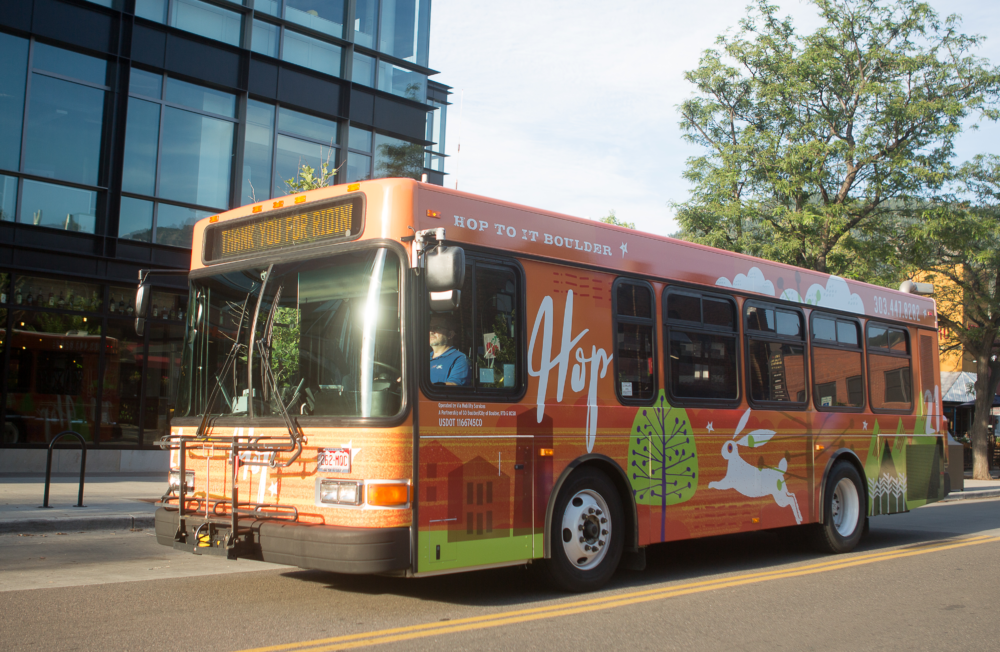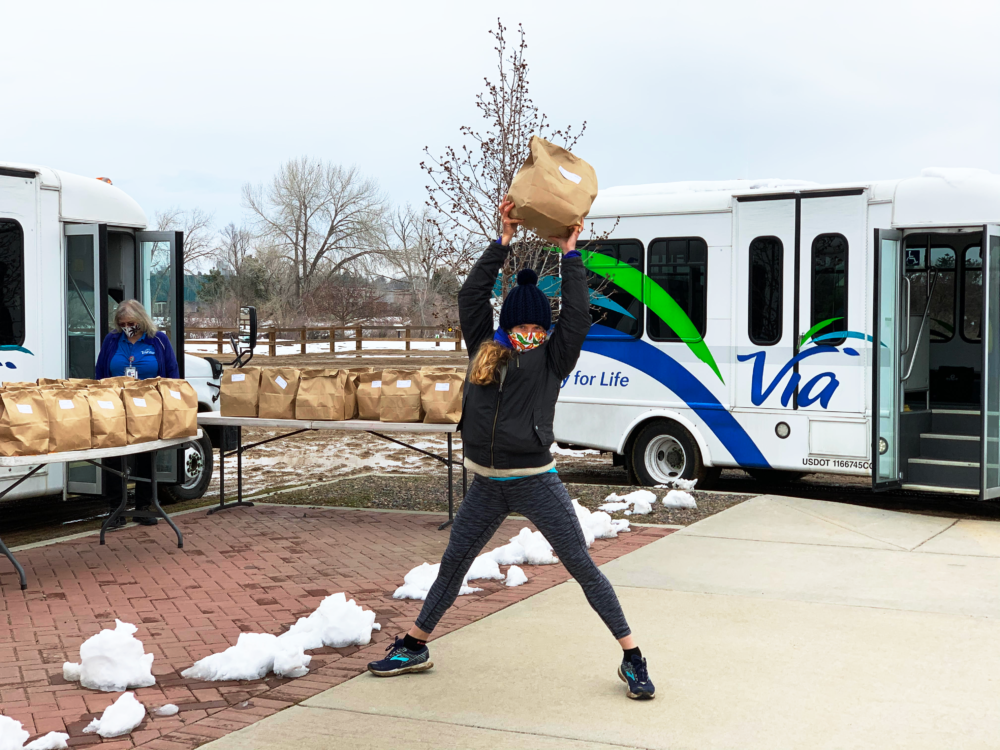By Dr. Houston G. Elam, Ph.D.*
When I joined the Via Mobility Services Board of Directors in October 2021, it quickly became apparent that I was woefully short of information about the vitality and complexity of the organization and its plans for the future in this changing, confusing world. This paper is the result of my efforts to overcome that problem. During this process I’ve also gained a greater appreciation for both the staff’s skill in managing daily business and the Board’s courage in setting impressive future-focused clean air goals and strategies.
Who is Via Mobility Services
Via Mobility Services is a dynamic, complex 501(c)(3) non-profit transportation agency whose mission is to increase the independence and self-sufficiency of older adults, people with disabilities, and individuals with lower incomes, in both rural and urban areas in Colorado. Launched 40 years ago, this multifaceted organization gives patrons the opportunity for a much more fulfilling life. It currently encompasses a large collection of local partnerships, several electric buses, land purchase negotiations for electric charging stations, and a one-call mobility solution finder, among other activities noted below.
Via’s Paratransit Transportation Services
Via’s paratransit service is a door-through-door service using an accessible vehicle. Similar to Uber and Lyft, Via takes people where they want to go. However, unlike Uber and Lyft drivers, Via’s specially-trained drivers meet clients at their door, walk them into the van, help them in with the wheelchair lift if needed, and secure the seat belt. Then, upon arrival at the destination, drivers bring them to the door and ensure they get inside safely. This service, which Via considers its bedrock service, continues to grow rapidly as the senior population grows. Via served roughly 3,000 clients in 2020 and expects to serve about 4,000 in 2022.
In July 2020, Via successfully met a large challenge when Seniors Resource Center (SRC) abruptly canceled its own extensive paratransit service. Via agreed to take on its operations and managed this absorption without missing any SRC appointments or impacting its existing customers.
Now Via operates in Longmont, throughout metropolitan Boulder, across the northern half of the Denver metro area, and in some parts of Larimer and Weld Counties. And it currently has under consideration a plan to expand its service area farther as such need is demonstrated.
Via Contract Partner Programs
In addition to its paratransit program, Via operates a social enterprise business model that includes an increasing array of transportation partnerships. This model provides Via with revenue that is plowed back into its mission services. Some of these partnerships include:
- The City of Boulder and the University of Colorado, to operate the HOP frequent-service shuttle, now the dominant public transportation service in that area. HOP covers the university campus, major retail and business districts, apartment complexes, and numerous other Boulder locations.
- HOP 2 Chautauqua, a free transit service leveraging the HOP fleet to the Colorado Music Festival and Chautauqua Summer Series events.

- RTD, which contracts with Via to operate Access-a-Ride and FlexRide (formerly Call ’n Ride) routes in parts of the metro region, including Boulder, Broomfield, and Adams counties, plus several low-density areas that would otherwise require RTD to manage inefficient scheduling challenges.
- Boulder County, the City of Littleton, the City of Lafayette, and the City of Lyons, providing paratransit services that fit their particular circumstances.
- Boulder County Farmers Markets, the Boulder County Area Agency on Aging, and several other human service agencies, to deliver food to clients using existing vehicles, volunteer drivers, and some scheduling creativity. This program received the Colorado Association of Transit Agencies (CASTA) 2020 Innovation of the Year award.

- The Climb, a special rural service provided for the rural mountain communities in Boulder County, especially Gold Hill.
- The Boulder Office of Emergency Management, which includes the city and the county of Boulder and affiliated nearby jurisdictions. Via provides a “second responder” service for that office, sending buses to evacuate residents in emergency zones as it did for the CalWood and Lefthand Canyon wildfires, and the recent tragic and scary Marshall fire. Under this partnership, when Via is advised about potential emergencies, it stands ready with key staff and off-duty drivers. This is an uncommon practice for a transportation service. Although Via is not compensated for this service, it feels it is a way to give back to the community. In the Marshall fire, Via engaged for more than 30 hours with 35 drivers and support staff assisting with evacuations. Via then made two buses available for several weeks to transport Marshal fire victims to necessary destinations.
Via is involved in an array of experimental pilot transit programs and services, with new partners to expand its personal mobility goals to help more and more people obtain better access in their communities. For example, Via and the Northern Front Range Metropolitan Planning Organization combined to begin providing service in rural Weld and Larimer counties. Not only was the pilot successful, but Via also received CASTA’s 2021 Outstanding Coordination Initiative Award.
Via’s Clean Air Climate Strategy
Following a strategy established by its board in the spring of 2021, Via will become a net-zero carbon emission, clean-air, multi-function transportation provider as soon as budgets will permit, by replacing the entire fleet with electric vehicles (EV) by 2035 or sooner. This will reduce tailpipe pollution for the metro Denver region. Electric buses will also provide a more stable refueling cost without the fluctuations of gasoline pricing. All of this contributes to better community health. Via already:
- is operating three EV buses on the HOP routes in the City of Boulder with plans for six more very soon. Plus, one locally-converted diesel-to-electric bus and several Prius hybrids are in regular fleet service, and fleet replacements will all be EV buses.
- has just purchased a property across the street from its Boulder headquarters to build, with its partners, a large EV recharging station. Thus, they are in the process of solving the critical recharging dilemma for the Boulder EV fleet.
- is proceeding with plans to convert its Boulder headquarters into a microgrid. Through solar panels and battery storage units, the facility will become entirely electrically operated.
- is currently searching for a building to purchase in Denver to serve as its nerve center for its aging former SRC bus fleet and related Denver operations. This building will also be converted to a microgrid.
In recognition of its clean air achievements and strategic goals, Via was named a Clean Air Champion by the Regional Air Quality Council (RAQC) last year. In addition to recognizing Via’s work, the RAQC made a charitable contribution on behalf of Via to Colorado CarShare, one of its nonprofit partners, to support its efforts to electrify its own car-sharing fleet.
Via’s 2022 Perspective
The observations I’ve outlined in this paper led me to the conclusion that Via is quite a unique organization. The competitive quality awards Via has received in the last two years confirm my stance. It is well managed, has a strong and stable financial history, and is committed to providing the highest quality service for its patrons, with its motto of ‘’Mobility for Life.” It has a thoughtful future-focus to the point that its board, staff, and budgets are all in sync on committing large investments to reach its ambitious clean air goals. Its ability to continue to stride forward is substantially dependent on a strong recognition and response by Colorado leaders that this particular jewel of an organization has earned serious financial support to hasten emissions reductions, which is strongly recommended in the 2040 Metro Vision Regional Transportation Plan.
In that context, it is fitting to end this report by noting that Via’s CEO Frank Bruno has Just won a 2022 DRCOG Distinguished Service Award, recognizing his long-standing leadership in finding community-based solutions to the region’s most urgent challenges at the intersection of aging, transportation, and clean air. In its award presentation, DRCOG points to the abrupt SRC shut down and also pointed to how Frank and “the entire Via Mobility staff deserve recognition for their extraordinary efforts” in solving that issue. My take: That’s typical of what they do.
 *Written by Dr. Houston G. “Tex” Elam, Ph.D. Upon retiring from a successful academic career, he has devoted himself to paratransit matters in the Greater Denver Region. He serves on the Via Board of Directors and is the spokesperson providing in-person updates bimonthly to the RTD Board of Directors on Access a Ride committee issues. He was the founding president of DRMAC, and first-year recipient of the RTD Champion of Transit Award, among many other honors. He points out that his twin brother recently celebrated his 90th birthday. He can be reached at tex@texandnan.com.
*Written by Dr. Houston G. “Tex” Elam, Ph.D. Upon retiring from a successful academic career, he has devoted himself to paratransit matters in the Greater Denver Region. He serves on the Via Board of Directors and is the spokesperson providing in-person updates bimonthly to the RTD Board of Directors on Access a Ride committee issues. He was the founding president of DRMAC, and first-year recipient of the RTD Champion of Transit Award, among many other honors. He points out that his twin brother recently celebrated his 90th birthday. He can be reached at tex@texandnan.com.
To learn more about Via Mobility Services and its accomplishments, please contact us:
Download White Paper